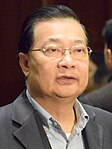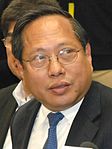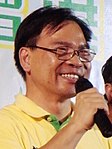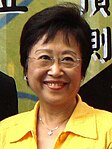2011 Hong Kong local elections: Difference between revisions
No edit summary |
|||
| Line 82: | Line 82: | ||
| map_caption = Map of the winning party by constituency |
| map_caption = Map of the winning party by constituency |
||
}} |
}} |
||
The '''2011 Hong Kong District Council elections''' were held on 6 November 2011. Elections were held to all 18 [[District Councils of Hong Kong]], returning 412 members from directly elected constituencies, each selecting a council member.<ref>{{cite web|url=http://www.info.gov.hk/gia/general/201111/07/P201111070090.htm |title=412 elected District Council members |publisher=Info.gov.hk |date=7 November 2011 |accessdate=20 November 2011}}</ref> |
The '''2011 Hong Kong District Council elections''' were held on 6 November 2011. Elections were held to all 18 [[District Councils of Hong Kong]], returning 412 members from directly elected constituencies, each selecting a council member.<ref>{{cite web|url=http://www.info.gov.hk/gia/general/201111/07/P201111070090.htm |title=412 elected District Council members |publisher=Info.gov.hk |date=7 November 2011 |accessdate=20 November 2011}}</ref> After the [[2010 Hong Kong electoral reform|government's constitutional reform package]] was passed in 2010, [[District Council (Second)|five new seats]] in the [[Legislative Council of Hong Kong|Legislative Council]] would be created in which the candidates would be nominated by all District Councillors. |
||
The [[pro-Beijing camp]] continued its success in this election and controlled all 18 District Councils. The pro-Beijing flagship party [[Democratic Alliance for the Betterment and Progress of Hong Kong]] remained the biggest winner by taking 136 seats, far ahead of the [[pro-democracy camp|pan-democracy]] flagship party [[Democratic Party (Hong Kong)|Democratic Party]]'s 47 seats. The Democratic Party faced challenges from radical democratic party [[People Power (Hong Kong)|People Power]] which campaigned against the Democratic Party and [[Association for Democracy and People's Livelihood]] (ADPL) which supported the [[2010 Hong Kong electoral reform|government's constitutional reform package]] in 2010. The People Power filled 62 candidates, most of them stood against the Democratic Party and ADPL candidates, including Democratic Party chairman [[Albert Ho]] and ADPL former chairman [[Frederick Fung]]. |
|||
Albert Ho and Frederick Fung were able to retain their seats, but other pan-democrat heavyweights who tried to gain seats in the District Councils in order to run in the new constituency in [[Hong Kong legislative election, 2012|next year's Legislative Council election]], including [[Tanya Chan]], [[Ronny Tong]] and [[Lee Cheuk-yan]], lost their bids to relatively unknown local councillors. |
|||
==Background== |
==Background== |
||
{{Main|Democratic development in Hong Kong|Consultation Document on the Methods for Selecting the Chief Executive and for Forming the LegCo in 2012}} |
{{Main|Democratic development in Hong Kong|Consultation Document on the Methods for Selecting the Chief Executive and for Forming the LegCo in 2012}} |
||
| ⚫ | The [[pan-democracy camp|pro-democracy camp]] had been urging for [[universal suffrage]] for decades. In 2005, a [[Democratic development in Hong Kong#2005 reform package|constitutional reform package]] was carried out by [[Donald Tsang]], the Chief Executive. However, it was voted down by the pan-democrats as it did not state a clear timetable or road map to achieve an ultimate universal suffrage. |
||
| ⚫ | The [[ |
||
On 29 December 2007, the [[NPCSC]] (China's Standing Committee of the National People's Congress) announced that the Chief Executive and all members of Legislative Council may be selected by universal suffrage in 2017 and 2020 respectively. The statement by Beijing was unclear and it implied the term "universal suffrage" may be defined by the Central Government. |
On 29 December 2007, the [[NPCSC]] (China's Standing Committee of the National People's Congress) announced that the Chief Executive and all members of Legislative Council may be selected by universal suffrage in 2017 and 2020 respectively. The statement by Beijing was unclear and it implied the term "universal suffrage" may be defined by the Central Government. |
||
Revision as of 10:19, 24 April 2017
| |||||||||||||||||||||||||||||||||||||||||||||||||||||||||||||||||||||||||||||||||||||||||||||
All Elected Constituencies 412 (of the 507) seats in all 18 Districts Councils | |||||||||||||||||||||||||||||||||||||||||||||||||||||||||||||||||||||||||||||||||||||||||||||
|---|---|---|---|---|---|---|---|---|---|---|---|---|---|---|---|---|---|---|---|---|---|---|---|---|---|---|---|---|---|---|---|---|---|---|---|---|---|---|---|---|---|---|---|---|---|---|---|---|---|---|---|---|---|---|---|---|---|---|---|---|---|---|---|---|---|---|---|---|---|---|---|---|---|---|---|---|---|---|---|---|---|---|---|---|---|---|---|---|---|---|---|---|---|
| Turnout | 41.49% | ||||||||||||||||||||||||||||||||||||||||||||||||||||||||||||||||||||||||||||||||||||||||||||
| |||||||||||||||||||||||||||||||||||||||||||||||||||||||||||||||||||||||||||||||||||||||||||||
 Map of the winning party by constituency | |||||||||||||||||||||||||||||||||||||||||||||||||||||||||||||||||||||||||||||||||||||||||||||
The 2011 Hong Kong District Council elections were held on 6 November 2011. Elections were held to all 18 District Councils of Hong Kong, returning 412 members from directly elected constituencies, each selecting a council member.[1] After the government's constitutional reform package was passed in 2010, five new seats in the Legislative Council would be created in which the candidates would be nominated by all District Councillors.
The pro-Beijing camp continued its success in this election and controlled all 18 District Councils. The pro-Beijing flagship party Democratic Alliance for the Betterment and Progress of Hong Kong remained the biggest winner by taking 136 seats, far ahead of the pan-democracy flagship party Democratic Party's 47 seats. The Democratic Party faced challenges from radical democratic party People Power which campaigned against the Democratic Party and Association for Democracy and People's Livelihood (ADPL) which supported the government's constitutional reform package in 2010. The People Power filled 62 candidates, most of them stood against the Democratic Party and ADPL candidates, including Democratic Party chairman Albert Ho and ADPL former chairman Frederick Fung.
Albert Ho and Frederick Fung were able to retain their seats, but other pan-democrat heavyweights who tried to gain seats in the District Councils in order to run in the new constituency in next year's Legislative Council election, including Tanya Chan, Ronny Tong and Lee Cheuk-yan, lost their bids to relatively unknown local councillors.
Background
The pro-democracy camp had been urging for universal suffrage for decades. In 2005, a constitutional reform package was carried out by Donald Tsang, the Chief Executive. However, it was voted down by the pan-democrats as it did not state a clear timetable or road map to achieve an ultimate universal suffrage.
On 29 December 2007, the NPCSC (China's Standing Committee of the National People's Congress) announced that the Chief Executive and all members of Legislative Council may be selected by universal suffrage in 2017 and 2020 respectively. The statement by Beijing was unclear and it implied the term "universal suffrage" may be defined by the Central Government.
Afterward, Donald Tsang carried out another reform package in 2009. While the Civic Party and the League of Social Democrats councilors resigned from Legislative Council in order to launch a de facto referendum against the package and urging for real universal suffrage, their ally, the Democratic Party went for negotiation with the mainland officials and carried out a revised proposal. On 24–25 June 2010, the revised package was passed through the Legislative Council. It brought out a major split within the pan-democracy camp. A new radical party, People Power led by Wong Yuk-man and Albert Chan was announced to punish those who betrayal the cause of democracy.[2] The People Power sent total number of 62 candidates into the election, most of them chose to contest with the Democratic Party and ADPL candidates.
According to the new reform package, general public are allowed to elect district council members into LegCo from the new five-seat district council functional constituency following their nomination within the councillors in the 2012 election. District councils election thus become a new battlefield for the new five seats of LegCo in which many heavyweights chose to run for a seat for the super seats of LegCo including Chan Yuen-han, Ronny Tong and Lee Cheuk-yan.
Pre-election controversies
Political donations
Just one month before the election in October 2011, a leaked document revealed that Jimmy Lai, media mogul of Apple Daily has long been donating money to many supporters of democracy groups.[3] For example, the Democratic Party received HK$13,690,000 from 2006 to 2010. While the Civic Party received HK$14,566,500 for the same period.[3] Democracy supporter Catholic Cardinal Joseph Zen was also seen receiving more than HK$20 million,[3] and the radical League of Social Democrats received HK$1 million last year. Former chief secretary Anson Chan received HK$1.3 million from 2007 to 2009.[3] According to Sina.com Lai was said to have donated about $10 million to democracy camp groups in a 5-year span.[4] The Wall Street Journal saw this as part of "a fresh campaign to accuse pro-democracy politicians of being stooges of foreign powers".[5]
Since 2009–2010 the top four political parties received a total of $70 million in donations.[6] Pro-establishment political groups are known to receive handsome political donations from many prominent Hong Kong businessmen. Out of that sum more than half ($48,370,000) went to the DAB. This amount was also 2.5 times more than the next pro-Beijing camp, Liberal Party as well as 7 times more than the sum received by pro-democracy camp groups like Civic Party and Democratic party.[6] The DAB received eight times the amount as the Democratic Party in 2009-10.[5]
However, there is a serious shortage of people donating to the democracy camp parties. Other than Lai, there seems to be nobody else in HK donating to the democracy camps any more.[6] According to Emily Lau, first there is definitely a question of transparency with regards to who is donating money.[6] There is also the issue of revealing donors. The WSJ believed that the taboo on discussing the activities of the Communist Party of China implies the Hong Kong government will never pass a law governing political parties. It added: "As a result, donor transparency will never be mandated."[5] The Communist Party of China bans and punishes people once they know who is donating to democracy camps.[6] In this election, the well-financed pro-Beijing parties swept the polls.[7]
Foreign domestic workers right of abode issues
Right of abode for foreign domestic workers in HK became an election issue as the Civic Party was closely identified with the legal advisers who represented one such Filipina.[8] The court case Vallejos v. Commissioner of Registration was one of the primary case in 2011. Pro-Beijing DAB argued that 125,000 workers were eligible, and would cause unemployment in Hong Kong to rise from 3.5% to between 7 and 10%.[9] The Pan-Democrats, particularly the Civic Party, were disadvantaged by this as many HK residents fear granting Filipinos permanent residency will affect them.[10]
Results
A post-handover record of 1.2 million voters cast their ballots. The pro-Beijing DAB secured the most seats. Albert Ho held his seat, but many other pro-democracy camp heavyweights lost their seat including Tanya Chan, Ronny Tong and Lee Cheuk-yan.[11] Democratic Party vice chairman Sin Chung-kai admitted that this was "a warning to the pro-democracy camp".[7] Template:Hong Kong district councils election, 2011
Results by district
| Council | Previous control |
Previous party |
Camp control |
Largest party |
class="unsortable" style="background:Template:Democratic Alliance for the Betterment and Progress of Hong Kong/meta/color; width:35px;"| DAB | class="unsortable" style="background:Template:Democratic Party (Hong Kong)/meta/color; width:35px;"| DP | class="unsortable" style="background:Template:Civil Force/meta/color; width:35px;"|CF | class="unsortable" style="background:Template:Association for Democracy and People's Livelihood/meta/color; width:35px;"|ADPL | class="unsortable" style="background:Template:Liberal Party (Hong Kong)/meta/color; width:35px;"| Lib | class="unsortable" style="background:Template:Civic Party/meta/color; width:35px;"| Civ | class="unsortable" style="background:Template:Hong Kong Federation of Trade Unions/meta/color; width:35px;"| FTU | Others | Pro-dem | Pro-Beijing | Appointed & ex officio |
Composition | Details | ||
|---|---|---|---|---|---|---|---|---|---|---|---|---|---|---|---|---|---|---|---|
| Central & Western | Pro-Beijing
style="width: 2px; color:inherit; background-color: #5FB04A;" data-sort-value="DPHK" | |
Democratic | Pro-Beijing
style="width: 2px; color:inherit; background-color: #1861AC;" data-sort-value="DABHK" | |
DAB | 5 | 4 | 1 | 5 | 4 | 11 | 3 |
|
Details | ||||||
| Wan Chai | Pro-Beijing
style="width: 2px; color:inherit; background-color: #1861AC;" data-sort-value="DABHK" | |
DAB | Pro-Beijing
style="width: 2px; color:inherit; background-color: #1861AC;" data-sort-value="DABHK" | |
DAB | 3 | 2 | 2 | 9 | 2 |
|
Details | ||||||||
| Eastern | Pro-Beijing
style="width: 2px; color:inherit; background-color: #1861AC;" data-sort-value="DABHK" | |
DAB | Pro-Beijing
style="width: 2px; color:inherit; background-color: #1861AC;" data-sort-value="DABHK" | |
DAB | 16 | 2 | 2 | 3 | 1 | 13 | 6 | 30 | 6 |
|
Details | ||||
| Southern | Pro-Beijing
style="width: 2px; color:inherit; background-color: #5FB04A;" data-sort-value="DPHK" | |
Democratic | Pro-Beijing
style="width: 2px; color:inherit; background-color: #5FB04A;" data-sort-value="DPHK" | |
Democratic | 2 | 5 | 1 | 1 | 8 | 6 | 11 | 3 |
|
Details | |||||
| Yau Tsim Mong | Pro-Beijing
style="width: 2px; color:inherit; background-color: #1861AC;" data-sort-value="DABHK" | |
DAB | Pro-Beijing
style="width: 2px; color:inherit; background-color: #1861AC;" data-sort-value="DABHK" | |
DAB | 8 | 1 | 8 | 2 | 15 | 3 |
|
Details | |||||||
| Sham Shui Po | NOC
style="width: 2px; color:inherit; background-color: #faf400;" data-sort-value="HKADPL" | |
ADPL | Pro-Beijing
style="width: 2px; color:inherit; background-color: #faf400;" data-sort-value="HKADPL" | |
ADPL | 4 | 7 | 10 | 7 | 14 | 3 |
|
Details | |||||||
| Kowloon City | Pro-Beijing
style="width: 2px; color:inherit; background-color: #1861AC;" data-sort-value="DABHK" | |
DAB | Pro-Beijing
style="width: 2px; color:inherit; background-color: #1861AC;" data-sort-value="DABHK" | |
DAB | 7 | 1 | 4 | 1 | 9 | 5 | 17 | 3 |
|
Details | |||||
| Wong Tai Sin | Pro-Beijing
style="width: 2px; color:inherit; background-color: #1861AC;" data-sort-value="DABHK" | |
DAB | Pro-Beijing
style="width: 2px; color:inherit; background-color: #1861AC;" data-sort-value="DABHK" | |
DAB | 9 | 3 | 2 | 1 | 1 | 9 | 9 | 16 | 4 |
|
Details | ||||
| Kwun Tong | Pro-Beijing
style="width: 2px; color:inherit; background-color: #1861AC;" data-sort-value="DABHK" | |
DAB | Pro-Beijing
style="width: 2px; color:inherit; background-color: #1861AC;" data-sort-value="DABHK" | |
DAB | 12 | 2 | 1 | 20 | 6 | 28 | 5 |
|
Details | ||||||
| Tsuen Wan | Pro-Beijing
style="width: 2px; color:inherit; background-color: #1861AC;" data-sort-value="DABHK" | |
DAB | Pro-Beijing
style="width: 2px; color:inherit; background-color: #1861AC;" data-sort-value="DABHK" | |
DAB | 4 | 1 | 2 | 1 | 9 | 4 | 13 | 3+2 |
|
Details | |||||
| Tuen Mun | Pro-Beijing
style="width: 2px; color:inherit; background-color: #1861AC;" data-sort-value="DABHK" | |
DAB | Pro-Beijing
style="width: 2px; color:inherit; background-color: #1861AC;" data-sort-value="DABHK" | |
DAB | 12 | 7 | 2 | 8 | 9 | 20 | 5+1 |
|
Details | ||||||
| Yuen Long | Pro-Beijing
style="width: 2px; color:inherit; background-color: #1861AC;" data-sort-value="DABHK" | |
DAB | Pro-Beijing
style="width: 2px; color:inherit; background-color: #1861AC;" data-sort-value="DABHK" | |
DAB | 7 | 3 | 2 | 2 | 17 | 5 | 26 | 5+6 |
|
Details | |||||
| North | Pro-Beijing
style="width: 2px; color:inherit; background-color: #1861AC;" data-sort-value="DABHK" | |
DAB | Pro-Beijing
style="width: 2px; color:inherit; background-color: #1861AC;" data-sort-value="DABHK" | |
DAB (majority) | 14 | 1 | 2 | 1 | 16 | 3+4 |
|
Details | |||||||
| Tai Po | Pro-Beijing
style="width: 2px; color:inherit; background-color: #1861AC;" data-sort-value="DABHK" | |
DAB | Pro-Beijing
style="width: 2px; color:inherit; background-color: #1861AC;" data-sort-value="DABHK" | |
DAB | 8 | 1 | 10 | 3 | 16 | 3+2 |
|
Details | |||||||
| Sai Kung | Pro-Beijing
style="width: 2px; color:inherit; background-color: #1861AC;" data-sort-value="DABHK" | |
DAB | Pro-Beijing
style="width: 2px; color:inherit; background-color: #1861AC;" data-sort-value="DABHK" | |
DAB | 7 | 2 | 3 | 2 | 10 | 9 | 15 | 3+2 |
|
Details | |||||
| Sha Tin | Pro-Beijing
style="width: 2px; color:inherit; background-color: #00a754;" data-sort-value="Civil Force" | |
Civil Force | Pro-Beijing
style="width: 2px; color:inherit; background-color: #00a754;" data-sort-value="Civil Force" | |
Civil Force | 9 | 5 | 12 | 1 | 11 | 8 | 28 | 6+1 |
|
Details | |||||
| Kwai Tsing | Pro-Beijing
style="width: 2px; color:inherit; background-color: #5FB04A;" data-sort-value="DPHK" | |
Democratic | Pro-Beijing
style="width: 2px; color:inherit; background-color: #5FB04A;" data-sort-value="DPHK" | |
Democratic | 5 | 9 | 2 | 13 | 15 | 13 | 5+1 |
|
Details | ||||||
| Islands | Pro-Beijing
style="width: 2px; color:inherit; background-color: #1861AC;" data-sort-value="DABHK" | |
DAB | Pro-Beijing
style="width: 2px; color:inherit; background-color: #1861AC;" data-sort-value="DABHK" | |
DAB | 4 | 1 | 1 | 4 | 1 | 9 | 3+8 |
|
Details | ||||||
Vote summary
Seat summary
Post-election issues
Following the election, pan-democrats complained of irregularities in voter registration records, and a number of candidates who lost in marginal seats made allegations of electoral fraud to the police. The government was criticised for failing to address the issue back in 2006 after alleged instances where multiple voters had registered under a same address surfaced. In defence, Chief Secretary Stephen Lam said that the matter was "investigated thoroughly five years ago", and that "no evidence of vote rigging were found".[12] The police received 16 such complaints in 2011.[13]
Among the irregularities alleged was that almost 100 voters in Central used registered offices and hotels as their home addresses.[13] Democratic Party candidate, Winfield Chong, who lost by 24 votes, said six buildings in the Sai Wan constituency used by approximately 120 voters to register were either being demolished or had been demolished; Yeung Sui-yin, who lost the Belcher seat by 33 votes, filed a complaint with the police, also alleging ballot rigging.[12][13]
ADPL candidate Lam Kin-man, who lost King's Park constituency by two votes, took up his complaint with the ICAC. Lam alleged that, for example, five registered voters at one flat in the constituency where he was candidate all had different surnames; none of the voters registered at seven flats were present or past owners.[12][13] two units said to have been used for storage purposes each had 10 registered voters.[14] Following up on the allegations, the ICAC mounted "Operation Wave Spray", according to which 22 suspects were found to have "provided false information about their residential addresses to election officers"; six of them were charged.[15]
References
- ^ "412 elected District Council members". Info.gov.hk. 7 November 2011. Retrieved 20 November 2011.
- ^ "A league torn apart". The Standard. Hong Kong. Archived from the original on 4 September 2014. Retrieved 20 November 2011.
{{cite web}}: Unknown parameter|deadurl=ignored (|url-status=suggested) (help) - ^ a b c d South China morning post. Lai hits back over donations furore . 19 Oct 2011.
- ^ "民建聯指捐款多或影響決策 – 新浪網 – 新聞". News.sina.com.hk. Archived from the original on 20 November 2011. Retrieved 20 November 2011.
{{cite web}}: Unknown parameter|deadurl=ignored (|url-status=suggested) (help) - ^ a b c "Black Hands' in Hong Kong", pg 16, The Wall Street Journal. December 5, 2011.
- ^ a b c d e "4大黨收獻金 年逾7000萬". worldjournal.com. 19 October 2011. Retrieved 20 November 2011.
- ^ a b Woo, Joyce (7 November 2011). "Pro-Beijing parties sweep Hong Kong district polls". yahoo!. AFP. Archived from the original on 5 December 2011.
{{cite news}}: Unknown parameter|deadurl=ignored (|url-status=suggested) (help) - ^ Dioquino, Rose-An Jessica (8 November 2011). "Pro-domestic workers candidates lose in HK polls". GMA Network. Archived on 5 December 2011
- ^ "Hong Kong: 'World City' or Racist?". Jakarta Globe. Archived from the original on 18 November 2011. Retrieved 20 November 2011.
{{cite web}}: Unknown parameter|deadurl=ignored (|url-status=suggested) (help) - ^ "HK Pro-Democracy Parties to Review Strategy After Election Defeats". VOA News. Retrieved 20 November 2011.
- ^ "Pro-Beijing Parties Sweep Hong Kong District Polls". Jakarta Globe. Retrieved 20 November 2011.[permanent dead link]
- ^ a b c Lee, Samson (29 November 2011) "Past haunts Lam on election fraud", The Standard. Retrieved 5 December 2011.
- ^ a b c d Lee, Colleen; Chong, Tanna; Lau, Stuart (29 November 2011). "Voter listed Four Seasons hotel as a home". South China Morning Post. Retrieved 5 December 2011.
- ^ Vote-rigging complaint by candidate RTHK. 29 November 2011. Archived 5 December 2011.
- ^ "ICAC detains 22 in vote-rigging probe". RTHK. 5 December 2011. Archived 5 December 2011.





